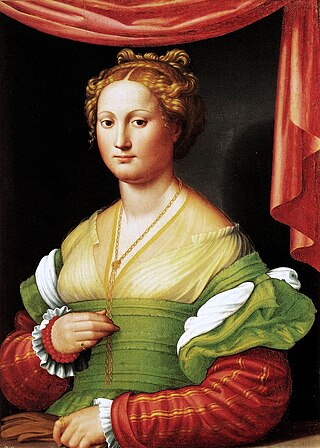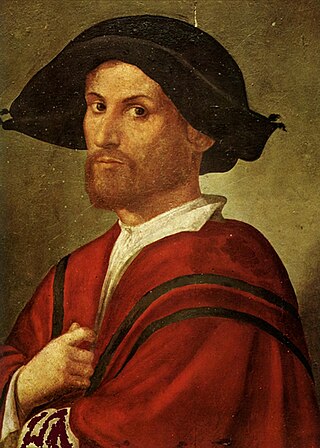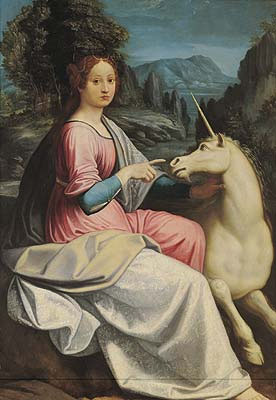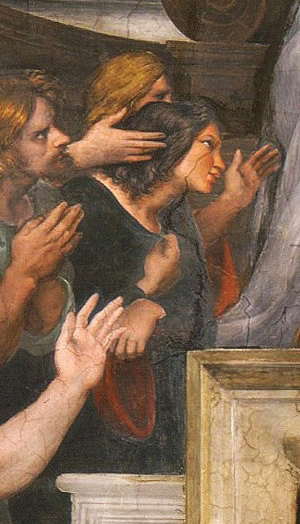Related Research Articles

Lucrezia Borgia was an Italian noblewoman of the House of Borgia who was the daughter of Pope Alexander VI and Vannozza dei Cattanei. She reigned as the Governor of Spoleto, a position usually held by cardinals, in her own right.

Pope Alexander VI, born Rodrigo de Borja, was head of the Catholic Church and ruler of the Papal States from 11 August 1492 until his death in 1503. Born into the prominent Borgia family in Xàtiva under the Crown of Aragon, Rodrigo studied law at the University of Bologna. He was ordained deacon and made a cardinal in 1456 after the election of his uncle as Pope Callixtus III, and a year later he became vice-chancellor of the Catholic Church. He proceeded to serve in the Curia under the next four popes, acquiring significant influence and wealth in the process. In 1492, Rodrigo was elected pope, taking the name Alexander VI.

The House of Borgia was an Italian-Aragonese Spanish noble family, which rose to prominence during the Italian Renaissance. They were from Valencia, the surname being a toponymic from the town of Borja, then in the Crown of Aragon, in Spain.

Giovanna "Vannozza" (dei) Cattanei was an Italian woman who was the chief mistress of Cardinal Rodrigo de Borgia, later to become Pope Alexander VI.

Giovanni Borgia, 2nd Duke of Gandía (1476–1497) was the second born and the second son of Pope Alexander VI and Vannozza Cattanei and a member of the House of Borgia. He was the brother of Cesare, Gioffre, and Lucrezia Borgia. He was murdered on 14 June 1497. Even today, it is not known with certainty who was responsible for his death, although many at the time blamed his brother Cesare.

Prince of Foxes is a 1947 historical novel by Samuel Shellabarger, following the adventures of the fictional Andrea Orsini, a captain in the service of Cesare Borgia during his conquest of the Romagna.

Giulia Farnese was an Italian noblewoman, a mistress to Pope Alexander VI, and the sister of Pope Paul III. Known as Giulia la bella, meaning "Julia the beautiful" in Italian, Giulia was a member of the noble Farnese family, who were prominent leaders in the Italian regions of Parma and Piacenza. After marrying into the noble Orsini family in the Papal States, Giulia soon acquainted herself with, and initiated an affair with, the Spanish Cardinal Rodrigo de Borja. When the cardinal was elected Pope, Giulia continued the increasingly advantageous liaison, which enabled her to have her brother Alessandro made a cardinal, until losing Alexander's favor at the turn of the century.

Francesco Maria I della Rovere was an Italian condottiero, who was Duke of Urbino from 1508 to 1516 and, after retaking the throne from Lorenzo II de' Medici, from 1521 to 1538.

Felice della Rovere, also known as Madonna Felice, was the illegitimate daughter of Pope Julius II. One of the most powerful women of the Italian Renaissance, she was born in Rome around 1483 to Lucrezia Normanni and Cardinal Giuliano della Rovere. Felice was well educated, became accepted into close courtly circles of aristocratic families, and formed friendships with scholars and poets through her education and genuine interest in humanism. Through the influence of her father, including an arranged marriage to Gian Giordano Orsini, she wielded extraordinary wealth and influence both within and beyond the Roman Curia. In particular, she negotiated peace between Julius II and the Queen of France, and held the position of Orsini Signora for over a decade following the death of her husband in 1517. Felice further increased her power through a castle that she bought with money received from her father, the Castle at Palo, and through her involvement in the grain trade.
"The Poisoned Chalice" is the pilot episode of the Showtime-Bravo! series The Borgias. It was written and directed by series creator Neil Jordan and originally aired on April 3, 2011, as the first half of a 2 hour premiere.
Orsino Orsini Migliorati (1473–1500) was the husband of Giulia "La Bella" Farnese (1474–1524), the mistress of Pope Alexander VI.

Eleonora Gonzaga, Duchess of Urbino was Duchess and sometime regent of Urbino by marriage to Francesco Maria I della Rovere, duke of Urbino. She served as regent during the absence of her spouse in 1532.

The Borgias is a historical-fiction drama television series created by Neil Jordan; it debuted in 2011 and was canceled in 2013.

Gerolama Orsini (1504–1569) sometimes Girolama Orsini was the Duchess of Parma as the wife of Pier Luigi Farnese, Duke of Parma. She served as Regent (Governor) of the Ducky of Castro in the name of her son Orazio, Duke of Castro between 1550 and 1553.

Borgia is a historical drama television series created by Tom Fontana for Canal+, ZDF, ORF, and Sky Italia. The show recounts the Borgia family's rise to power and subsequent domination of the Papal States during the Renaissance.
"The Moor" is the third episode of the Showtime-Bravo! series The Borgias. It was written by series creator Neil Jordan and directed by Simon Cellan Jones. It originally aired on April 10, 2011.
"The Confession" is the final episode of the second season of Showtime-Bravo! historical drama The Borgias. It was written by Guy Burt and directed by David Leland. It originally aired on June 17, 2012.

The Borgia is a 2006 Spanish-Italian biographical film directed by Antonio Hernández. It stars Lluís Homar, Sergio Peris-Mencheta and María Valverde as, respectively, Rodrigo, Cesare and Lucrezia Borgia.

Vittoria Farnese, also known as Vittoria, Princess of Parma, and by her married name Vittoria Farnese della Rovere, was an Italian noblewoman, Duchess consort of Urbino from 1548 until 1574 by marriage to Guidobaldo II della Rovere, Duke of Urbino.
Laura Orsini was an Italian noblewoman, daughter of Giulia Farnese and, presumably, of her lover Pope Alexander VI Borgia.
References
- ↑ Gorman, Bill (April 5, 2011). "Sunday Cable Ratings: 'Army Wives,' Kardashians Lead Night; + 'The Killing,' 'The Borgias,' 'Breakout Kings + Much More". TV by the Numbers. Archived from the original on April 8, 2011. Retrieved May 1, 2012.